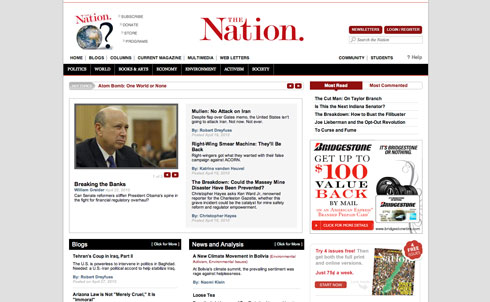
The Nation has been a home for influential opinion and analysis and hard-hitting investigative reporting since its founding, and TheNation.com has broadened the magazine’s reach and dramatically grown the community of Nation readers. Here are 15 of the biggest stories to appear on TheNation.com over the past decade.

Earlier this month a federal court of appeals ruled that the FCC had overstepped its bounds by enforcing net neutrality, hampering consumers’ ability to use the Internet to freely exchange information. In 2006, Jeff Chester reported on the importance of net neutrality, and what it could mean if telecom companies could charge fees for faster Internet service or ad space. “Imagine how the next presidential election would unfold if major political advertisers could make strategic payments to Comcast so that ads from Democratic and Republican candidates were more visible and user-friendly than ads of third-party candidates with less funds.” Congress may yet seek to regulate net neutrality, so four years later, we are still waiting to see whether politicians will side with American consumers or corporations.

Police tape sections off the Danziger Bridge, where six civilians were wounded and two shot and killed by New Orleans police officers in the aftermath of Hurricane Katrina. Federal officials begun investigating the incident after Nation reporter A.C. Thompson broke this story, and exposed several other white vigilante and police shootings of African Americans in New Orleans, in December 2008. Thompson’s latest reporting includes evidence implicating the New Orleans police department for covering up several killings.
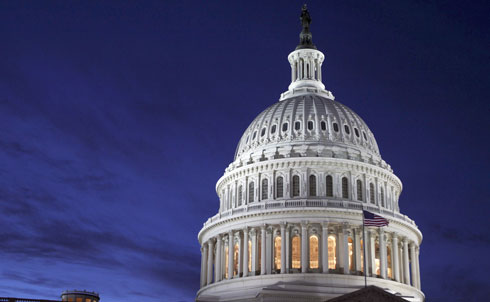
Lawrence Lessig’s February piece "How to Get Our Democracy Back" makes a bold call for fundamental reform of Congress that curtails the unfettered power of special interest groups. Lessig is most disappointed in Obama for breaking his campaign promise to “fundamentally change the way Washington works.” The need to reform Congress is imperative, Lessig argues, because it has become nothing more than the “Fundraising Congress.”

Jon Town was standing in his battalion headquarters in Ramadi, Iraq, when a rocket struck two feet above his head. But doctors were skeptical when he complained of hearing loss and pain resulting from shrapnel embedding his neck. Instead, they claimed he had Personality Disorder—a preexisting condition giving the Department of Veterans Affairs authority to deny Town medical attention and refuse to pay him for his military services. Afterward, Town discovered he actually owed the Army for not fulfilling his contract. Town is not alone. A three-year investigation by Nation writer Joshua Kors has unearthed multiple cases in which the Army has claimed determined that a solider has Personality Disorder and is therefore not liable for medical care. Numbers of soldiers diagnosed with PD continues to rise as the Army saves billions.

In September of 2009, Nation editor Katrina vanden Heuvel and her husband, contributing editor Stephen F. Cohen, interviewed former Soviet President Mikhail Gorbachev at his foundation in Moscow. As the twentieth anniversary of the fall of the Berlin Wall approached, The Nation gave the leader most responsible for that historic event a chance to be heard, on his own terms, in the United States.

Many feminists supported Hillary Clinton’s run for President. But as she stumbled and Barack Obama closed in, her campaign began making oblique reference to Obama’s race, seemingly attempting to cast him as the “black candidate,” to the dismay of the feminist community that had rallied behind her. As Betsy Reed writes in “Race to the Bottom,” many feminists cried foul. They were similarly troubled by Clinton’s attempts to “compete on a macho foreign policy playing field”–as seen in her threats to “totally obliterate” Iran and imply that Obama couldn’t make tough decisions.
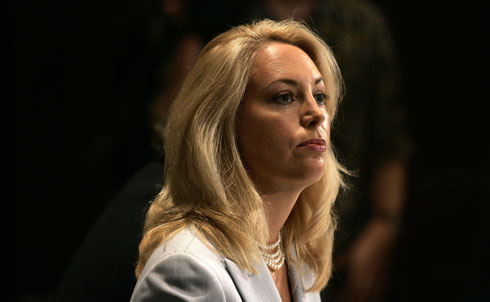
In July 2003, Robert Novak revealed Valerie Plame’s identity as a CIA operative, setting off a scandal and a criminal investigation. At the heart of the investigation was what Valerie Plame’s status within the CIA really was. David Corn, co-author of Hubris: The Inside Story of Spin, Scandal and the Selling of the Iraq War, takes Nation readers through Plame’s life as a CIA agent.

In September 2006, The Nation ran a photograph taken the previous month of presidential candidate John McCain boarding a yacht rented by Raffaello Follieri and his then-girlfriend Anne Hathaway. Follieri pleaded guilty in September of wire fraud, money laundering and misappropriating about $2.4 million of investor money into personal bank accounts. McCain’s connection to Follieri was more than just social–Follieri promised to help McCain win Catholic votes in exchange for business financing from McCain’s campaign manager Rick Davis, a high-powered lobbyist. “The Nation has obtained a photo revealing just how star-struck a straight-talking maverick can become when offered the chance to celebrate his birthday aboard a yacht filled with celebrities–even if one of those celebrity types turns out to be an A-list con man,” write Ames and Berman.

When Matthew Murray stormed into a Christian church and shot four congregants in 2007, and then killed himself, the mainstream media did little analysis of what drove Murray to violence. Max Blumenthal chronicled Murray’s “trauma-wracked mentality” in his book Republican Gommorah: Inside the Movement that Shattered the Party, excerpted in The Nation’s “The Nightmare of Christianity.” Raised by strict, evangelical parents who were fanatically devoted to the New Life Church with Pastor Ted Haggard, Murray wrote of his loneliness, self-injury and confusion on web forums and began replacing the Bible with the Satanist teachings. Before Murray’s shooting spree, Pastor Haggard was convicted of fraud and illicit sex, but was pardoned as “completely heterosexual” by the movement’s elders. In response, Murray wrote: “I want to know where was all the love, mercy and compassion for my supposed imperfections?”

The first editorial to appear in The Nation after September 11, 2001, reflected solemnly, “We have taken a great wound.” September 11 would test the nation’s character; fragile civil liberties would face even greater attack. It was necessary, the editors stressed, to rely on facts not “fearsome shadows or injured hubris.” The Nation asked for “deeper arguments” about the US role in the world, arguing, “This is a pivotal moment when we should reconsider our posture toward the world and examine the true burdens and obligations of acting like an empire awesomely more powerful than any others and answerable to no one.”

In a March 2003 comment, Jonathan Schell argued that the decision to invade Iraq would lead to tragedy. “The decision to go to war to overthrow the government of Iraq will bring unreckonable death and suffering to that country, the surrounding region, and, possibly the United States,” Schell wrote. “The tragedy of America in the post-cold war era is that we have proved unequal to the responsibility that our own power placed upon us.”
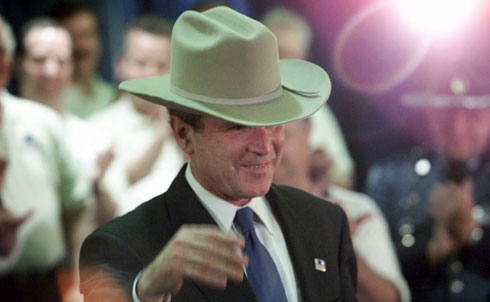
The late Molly Ivins captured, in all her humor and candor, the deal with the Lone Star State. Asking “Is Texas America?,” Ivins did not beat around the bush–or George “Dubya” Bush–on Texans pride for the state’s size, culture, and politics. “If you want to understand George W. Bush—unlike his daddy, an unfortunate example of a truly Texas-identified citizen—you have to stretch y our imagination around a weird Texas amalgam: religion, anti-intellectualism and machismo,” she wrote. “All big, deep strains here, but still an odd combination. Then add that Bush is just another li’l upper-class white boy out trying to prove he’s tough.”

In August 2004, the Bush White House began creating a “watch list” of countries at “high risk” for conflict or disaster. Alongside the list, they drafted plans for each country’s “democratic, market-oriented” reconstruction. In an article entitled “The Rise of Disaster Capitalism,” Naomi Klein called this kind of intervention a new era of colonialism. “Where there is destruction there is reconstruction, a chance to grab hold of ‘the terrible barrenness,’ ” wrote Klein. “Disaster, it seems, is the new terra nullius.”
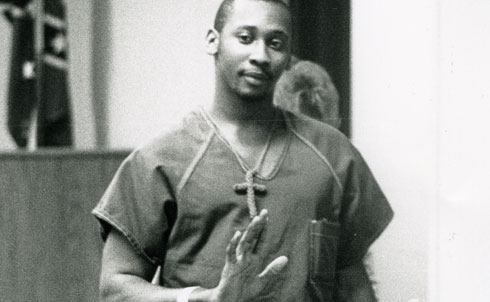
On his blog highlighting activism and social justice organizing, Act Now!, Peter Rothberg has called attention to the plight of Troy Anthony Davis, sentenced to death despite persuasive evidence that he is innocent of the murder with which he is charged. Readers have responded en masse to Rothberg’s calls for action, sending messages on Davis’s behalf to the Georgia State Board of Pardons & Paroles. Less than 24 hours before Davis was scheduled to die by lethal execution, the court stopped the execution, citing “last-minute questions of his innocence.” “As a comprehensive recent report by Amnesty International shows, no physical evidence against Davis was ever found and the weapon used in the crime was never located,” wrote Rothberg. “The case against him consisted entirely of witness testimony which contained numerous inconsistencies even at the time of trial.” In August 2009, the Supreme Court ordered the Court for the Southern District of Georgia to "receive testimony and make findings of fact as to whether evidence that could not have been obtained at the time of trial clearly establishes petitioner’s innocence." As of April 2010, Davis is still awaiting a hearing date.
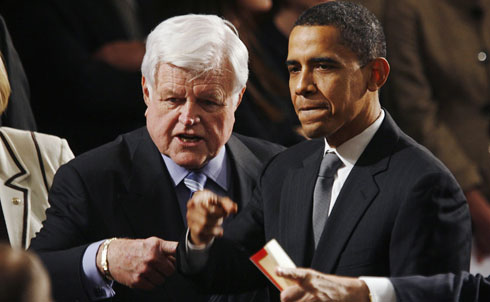
On her blog, “Editor’s Cut,” Katrina vanden Heuvel reflects on the death of liberal giant Sen. Ted Kennedy, a close friend of her father’s and a fighter who stood by “the underdog, the poor, the most vulnerable, who he believed deserved lives of dignity.” Katrina urges Obama and the members of Congress to be inspired by Kennedy’s own fight for universal health care to guide their own push for reform. Eight months later, President Obama signed the Patient Protection and Affordable Care Act into law.


